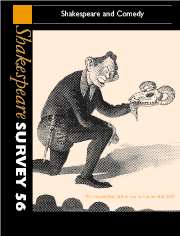Book contents
- Frontmatter
- Looking Like a Child – or – Titus: The Comedy
- Comedy and Epyllion in Post-Reformation England
- (Peter) Quince: Love Potions, Carpenter’s Coigns and Athenian Weddings
- ‘When Everything Seems Double’: Peter Quince, the other Playwright in A Midsummer Night's Dream
- Cultural Materialism and Intertextuality: The Limits of Queer Reading in A Midsummer Night's Dream and The Two Noble Kinsmen
- As You Liken It: Simile in the Wilderness
- Infinite Jest: The Comedy of Hamlet, Prince of Denmark
- Othello and the End of Comedy
- Shakespeare as a Joke: The English Comic Tradition, A Midsummer Night’s Dream and Amateur Performance
- Falstaff’s Belly, Bertie’s Kilt, Rosalind’s Legs: Shakespeare and the Victorian Prince
- The Sixth Act: Shakespeare after Joyce
- The Return of Prospero’s Wife: Mother Figures in The Tempest’s Afterlife
- Directing Shakespeare’s Comedies: In Conversation with Peter Holland
- ‘To Show our Simple Skill’: Scripts and Performances in Shakespearian Comedy
- John Shakespeare’s ‘Spiritual Testament’: A Reappraisal
- Shakespeare as a Force for Good
- Timon of Athens and Jacobean Politics
- Man, Woman and Beast in Timon’s Athens
- Rough Magic: Northern Broadsides at Work at Play
- Shakespeare Performances in England, 2002
- Professional Shakespeare Productions in the British Isles January–December 2001
- The Year's Contributions to Shakespearian Study 1 Critical Studies
- 2 Shakespeare’s Life, Times and Stage
- 3 Editions and Textual Studies
- Books Received
- Index
Othello and the End of Comedy
Published online by Cambridge University Press: 28 March 2007
- Frontmatter
- Looking Like a Child – or – Titus: The Comedy
- Comedy and Epyllion in Post-Reformation England
- (Peter) Quince: Love Potions, Carpenter’s Coigns and Athenian Weddings
- ‘When Everything Seems Double’: Peter Quince, the other Playwright in A Midsummer Night's Dream
- Cultural Materialism and Intertextuality: The Limits of Queer Reading in A Midsummer Night's Dream and The Two Noble Kinsmen
- As You Liken It: Simile in the Wilderness
- Infinite Jest: The Comedy of Hamlet, Prince of Denmark
- Othello and the End of Comedy
- Shakespeare as a Joke: The English Comic Tradition, A Midsummer Night’s Dream and Amateur Performance
- Falstaff’s Belly, Bertie’s Kilt, Rosalind’s Legs: Shakespeare and the Victorian Prince
- The Sixth Act: Shakespeare after Joyce
- The Return of Prospero’s Wife: Mother Figures in The Tempest’s Afterlife
- Directing Shakespeare’s Comedies: In Conversation with Peter Holland
- ‘To Show our Simple Skill’: Scripts and Performances in Shakespearian Comedy
- John Shakespeare’s ‘Spiritual Testament’: A Reappraisal
- Shakespeare as a Force for Good
- Timon of Athens and Jacobean Politics
- Man, Woman and Beast in Timon’s Athens
- Rough Magic: Northern Broadsides at Work at Play
- Shakespeare Performances in England, 2002
- Professional Shakespeare Productions in the British Isles January–December 2001
- The Year's Contributions to Shakespearian Study 1 Critical Studies
- 2 Shakespeare’s Life, Times and Stage
- 3 Editions and Textual Studies
- Books Received
- Index
Summary
Othello begins at the moment when comedies end, with a happy marriage. It begins, too, where The Merchant of Venice and Twelfth Night leave off, with the question of ethnic or social outsiders - Shylock, Malvolio - as the catalysts for the destructive elements within society. It might seem that here the terms are reversed, with the dangerous alien now the hero, while the mysterious, incomprehensibly malicious, diabolical villain is the insider, one of us. But in fact, the insider/outsider dichotomy is really a false one, because just as Shylock is essential to Bassanio's wooing, and Malvolio is essential to both Olivia's household and ultimately even to the marriage of Viola and Orsino, so is Othello essential to the safety and prosperity of the Venetian state. The tragedy is not that Othello is essential to Venice, but that Iago is essential to Othello.
We have, historically, focused on the interracial marriage as the crucial source of tension and tragedy in the play. But the larger issue in Othello has to do with the tragic implications not of miscegenation but of patriarchy on the one hand, and patronage or gender bonding (not limited to males in this case) on the other. I begin with the first: patriarchy is an issue that often provides both the principal motivation of comedy and a strong tragic element within it - as in the cases of Celia's villainous father in As You Like It and the obdurate Egeus in A Midsummer Night's Dream.
- Type
- Chapter
- Information
- Shakespeare SurveyAn Annual Survey of Shakespeare Studies and Production, pp. 105 - 116Publisher: Cambridge University PressPrint publication year: 2003



